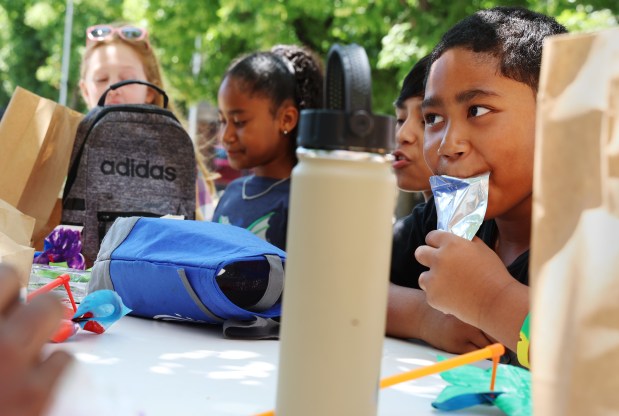About a dozen children sat around a cafeteria table outside Newton Bateman Elementary School in the Irving Park neighborhood Monday, talking and giggling as they ate their oranges and sandwiches. Most came directly from Bateman’s FORGE summer camp, a three-week program offering art, theater, fitness, robotics and chess activities. This was the first day of Chicago Public Schools’ free summer lunch program, offering midday meals to local children at no cost.
Through the district’s “LunchStop” program, any child 18 and younger can receive a free meal at one of 15 locations across the city. A map of these locations can be found here.
The program runs Monday through Friday from 10:30 a.m. to 12:30 p.m. through Aug. 9.
Children can also access a free lunch through the district’s in-school summer programs, offered at over 300 schools across the city.
The only requirement for free lunch is that it be eaten on-site. Parents can but are not required to accompany their children to pick up the free lunches, according to Justine Britten, CPS nutrition program manager.
LunchStop is funded by the Summer Food Service Program, a national program funded by the United States Department of Agriculture and administered by the Illinois State Board of Education. SFSP reimburses organizations for providing meals to low-income children when school is not in session.
The LunchStop program aims to ensure Chicago children eat lunch daily during summer break, the district said in a news release.
This includes children of migrant families. More than 43,000 migrants have arrived in Chicago since August 2022 according to the city. And as Mayor Brandon Johnson moves forward with plans to evict migrant families from shelters — citing overstretched resources and shelters’ 60-day stay limit for migrants — and more shelters open, the migrant population in Chicago is in flux, with some families settling in permanent housing and others landing in shelters spread across the city.
District officials tried to choose outdoor sites near migrant shelters for the LunchStop program, according to Britten. “Thinking about the different demographics of the city, we tried to pick outdoor sites according to that too.”
The program also supports children participating in summer camps. Particularly with recent crime — including incidents in which Chicago youth have been victims — Britten said CPS is focused on having a variety of summer offerings.
“Our aim in the nutrition department is just to feed students, and we see that as a way of supporting the whole child, keeping them fed,” Britten said. “We know that helps keep kids feeling good, feeling happy, and lets them continue to engage in their academics or whatever kind of summer program they might be involved in.”
The district does not track the number of children receiving free lunches during summer break, a spokesman told the Tribune.
The LunchStop program is appreciated in the neighborhood, particularly in combination with other neighborhood programs, according to Virginia Hansen, Bateman’s cafeteria manager.
“We have the Boys and Girls and Club over there, and they help out with programs too,” said Hansen, referring to the organization that runs the after-school program at Bateman.
Hansen said working to ensure Chicago children get lunch is important for all of the children in the neighborhood, and she noted an uptick in the number of migrant children in the area this school year. She estimates that there are about 80 migrant children at Bateman, a school where nearly 40% of students are English learners, according to 2023-2024 CPS data.
During Bateman’s summer camp last week, Hansen said she told parents that the program would be available every weekday throughout the summer, pointing to a flyer printed in Spanish displayed next to the lunches.
“They’re always entitled to a meal,” Hansen said. “So, hopefully, they always do this.”





